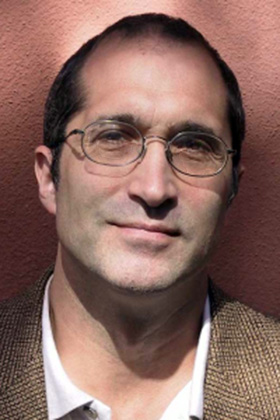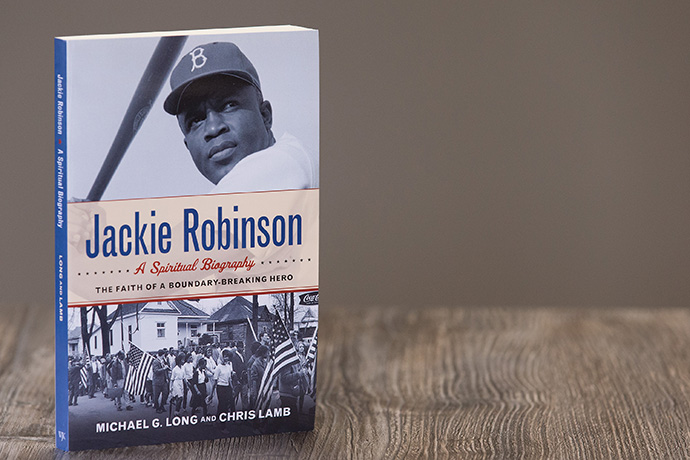In 42, the 2013 movie about Jackie Robinson, Brooklyn Dodgers president Branch Rickey tells his chief scout he’s going to sign the ballplayer: “Robinson’s a Methodist. I'm a Methodist. God's a Methodist. We can’t go wrong.”
Rickey probably never uttered the words, his biographer, Lee Lowenfish, says.
Both Rickey and Robinson were indeed lifelong Methodists, and each relied on his respective faith to withstand the abuse and threats that came with breaking baseball’s color line and forcing not just the national pastime but society to live up to its promise of racial equality.

Chris Lamb.
Courtesy of Indiana University School of the Liberal Arts.
The movie 42 does not dwell much on Robinson’s religion and neither did the Ken Burns’ documentary on the ballplayer in 2016.
Much has been written about Robinson’s athleticism, his dignity, and his courage in confronting racism in baseball. Pitchers threw at his head. Baserunners spiked him. Spectators yelled the most vulgar of obscenities. Death threats came in the mail.
Robinson was indeed one of the greatest athletes in American history and perhaps its most courageous. But athleticism and courage alone cannot explain how he prevailed against such long odds.
Commentaries
What is often overlooked in accounts of Robinson’s life is the importance of his faith. This is why my co-author Michael Long, a professor of religious studies at Elizabethtown College, and I wrote the book Jackie Robinson: A Spiritual Biography (Westminster John Knox Press).
Robinson’s faith is necessary to understanding how he dealt with the brutal racism that came with breaking Major League Baseball’s color barrier, but also with overcoming racism and poverty as a child, his court martial in the U.S. Army for refusing to go to the back of a military bus, and his work as a civil rights activist after he retired from baseball.
Robinson’s Christian faith acted as a source of inspiration and motivation, comfort and strength, wisdom and direction. It was the engine that drove and sustained him as he shattered racial barriers on and off the baseball diamond.
He could not have accomplished what he did without the faith that was introduced and nurtured by the people who had the most profound impact on him.
Robinson’s mother, Mallie, left rural Georgia and took her five children to Pasadena, California. She constantly told her children that God would take care of them.
She grew concerned about Jackie when he entered adolescence and often found himself in trouble, prompted by racial antagonism. She asked Karl Downs, the new minister at Scott Methodist Church, to speak to her son.
Downs took him from the troubled streets of Pasadena, becoming a father figure and the channel through which religion “flowed into Jack’s consciousness,” Arnold Rampersad wrote in his 1997 biography of Robinson. “Faith in God then began to register in him as both a mysterious force, beyond his comprehension, and a pragmatic way to negotiate the world.”
Robinson’s faith sometimes put him in conflict with others in the raucous world of athletics. While playing in the Negro leagues, Robinson scorned his whiskey-drinking and promiscuous teammates, once tossing a glass of Scotch into a lit fireplace to demonstrate the lethality of liquor.
Robinson’s wife, Rachel, who also was a Methodist, comforted her husband during his arduous journey and left him alone for his nightly prayers. In an interview during his playing career, Robinson emphasized his nightly ritual of prayer. “It’s the best way to get closer to God,” he said.
And finally, Branch Rickey, the man who had signed him, was a devout Methodist, too, who refused to attend baseball games on Sundays.
When Rickey met Robinson in August 1945, he told the ballplayer he wanted to sign him to a contract. But for Robinson to succeed, Rickey said, he could not respond to the racial indignities that would come his way.
“I’m looking for a ballplayer with guts enough not to fight back,” Rickey said.
Rickey then read Jesus’s words from the Gospel of Matthew: ”But whoever shall smite thee on the cheek, turn to him the other also.” Robinson, who was well aware of the Bible verse, responded, “I have two cheeks, Mr. Rickey. Is that it?”
Robinson did not forget the promise to Rickey to turn the other cheek. “In observing that trust,” Rickey said admiringly about Robinson, the ballplayer was “almost Christ-like.”
Robinson died 45 years ago, on October 24, 1972. He was just 53. His epitaph reads: “Life is not important except in the impact it has on other lives.”

Cover art for “Jackie Robinson: A Spiritual Biography,” published by Westminster John Knox Press. The book was co-authored by Chris Lamb, professor of journalism at Indiana University-Purdue University at Indianapolis and Michael Long, professor of religious studies at Elizabethtown College. Photo by Mike DuBose, UM News.
I have read and written widely about Robinson, but it was not until I was researching Jackie Robinson: A Spiritual Biography that I really understood where he found the fortitude to maintain such grace under unrelenting pressure.
When I was writing the book, my son, a baseball fan, was going through confirmation at St. Luke’s United Methodist Church in Indianapolis, Indiana. There was a time or two when I used the story of Jackie Robinson to respond to something he was taught in his confirmation class.
I sometimes think of Robinson when I feel aggrieved. Robinson would have been justified to strike back at his aggressors. And yet he did not.
By turning the other cheek in the face of viciousness, Robinson exemplified redemptive suffering. “I can testify to the fact that it was harder to turn the other cheek and refuse to fight back than it would have been to exercise a normal reaction,” Robinson once said. “But it works, because sooner or later it brings a sense of shame to those who attack you. And that shame is often the beginning of progress.”
Chris Lamb is a professor of journalism at Indiana University-Purdue University at Indianapolis. To read more United Methodist news, subscribe to the free Daily or Weekly Digests.
Like what you're reading? Support the ministry of UM News! Your support ensures the latest denominational news, dynamic stories and informative articles will continue to connect our global community. Make a tax-deductible donation at ResourceUMC.org/GiveUMCom.




